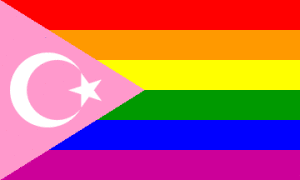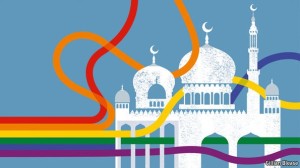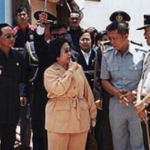Young Muslim gay Indonesians search for a balance between their natural sexual orientation and the proscriptions against homosexuality found in the Koran. For some it means renouncing Islam and for others it means being celibate.
September 23, 2009
Despite living under the same roof for years, Fachri (not his real name) thought his father had no clue that he was gay. But around five years ago, when he borrowed his father’s Koran to research a project, he was surprised to find certain verses underlined in pencil.
They were about God’s wrath toward people who committed acts of sexual deviance during the time of Prophet Luth (or Lot), the Islamic equivalent of the Sodom and Gomorrah text in the Bible.
Growing up in a religious family that adheres to Islamic teachings, it was not the first time Fachri had come across the verses. It was sort of touching, he said, how his father seemed to want to know him better, although he wished it was not through the religious text he despised.
(photo right: Istiqlal Mosque in Jakarta)
“The text was one of the reasons why I decided to renounce my religion. I have lost faith in any kind of religion because it excludes us, condemns us,” said the 31-year-old advertising executive. “It creates an absolute border, whereas a human being is a complex thing.
“Why should I embrace religion when it doesn’t accept us? Why should I adhere to Islam, or any religion for that matter, when there is no space for me?”
In Indonesia, where religion plays a dominant role in society and where 90 percent of the population is Muslim, homosexuality is not punishable by law but condemnation of homosexuality has been voiced by many religious leaders, not only Islamic.
Aceh, which adheres to Islamic Shariah law, recently issued a controversial bylaw mandating adulterers to be stoned to death and homosexuality and premarital sex to be punished by 100 lashes of a rattan cane.
In the remainder of the secular country, society in general is conservative, which means that being gay risks at least mockery and losing face with family and friends. Although gay-bashing is a rare extreme here, gay people continue to experience bias and prejudice.
Facing condemnation from religious leaders, Fachri chose to renounce his faith. But many other gay people embrace their profoundly held religious beliefs regardless of what the Islamic teachings say about their sexuality.
Adhe Oktav said that being a lesbian did not prevent her from praying five times a day, fasting and carrying out her obligations as a Muslim.
“I was raised with religious values and continue to adhere to them now. It’s my way of being grateful to God,” she said.
“It is my personal relationship with God, regardless what people say. I never asked to be born, let alone be a lesbian. I don’t see myself as committing a sin regarding my sexual preference. Even if I am, let God be the judge of that.”
Dody (not his real name) said the condemnation of homosexuality was caused by a too literal reading of Islamic lessons. “I believe that religious teaching should be seen in context. I don’t think that homosexuality is a sin,” he said. “I think God created gay people with a purpose — it’s not a disease or a sin. Like everything in nature, there is always an anomaly.”
But not all gay people are like Adhe and Dody, who embrace their sexuality and their religion together. Many of them willingly embrace their religion, but the perception of homosexuality as a sin causes a confusion of guilt and conflict between society, their families and themselves.
Farid, who only wanted to be identified by his first name, said that a part of his religiosity was compensation for him being gay, which he sees as a sin.
“I still carry out my obligations according to Islamic teachings, and it’s up to God whether He will accept them or not. I pray that He will,” he said.
He believes his sexuality is a disease.
“I would like to get married to a woman and have kids someday, but at the moment I’m still not able to do that,” he said, adding that he still dates men and is sexually active, and feels extremely remorseful about that.
“I pray to God that someday He’ll cure me and make me straight,” he said, sighing.
The seemingly taboo mix of religion and sexuality makes some gay people, like openly gay columnist Samuel Mulia, 46, opt for celibacy. He believes that homosexuality itself is not condemned, but that it is the sexual act that is disapproved of by God.
Samuel said he used to resent religion, but then he lost a kidney to disease, which made him start to think about God and religion. He became a born-again Christian.
“I began to think that God loves me, regardless of my sexuality. I then started to go to church and study the Bible, and came to the conclusion that it’s not the sexuality that is sinful, but the sexual intercourse. So five years ago, I decided to practice celibacy,” said Samuel, whose urban culture commentary appears every Sunday in Kompas newspaper.
While his Facebook status updates are full of sexual innuendo, Samuel said it is only a social experiment to gauge people’s reactions.
“I used to be very promiscuous but I’ve been celibate for five years and I’ve never been happier,” he said. “I think that’s what God wants and I adhere to that because I don’t want to go to hell.”
Some gay people criticize Samuel for denying his human needs.
“It’s our sexuality that makes us different,” said Budi (not his real name). “We are called gay because of our sexual preference. Denying or repressing it won’t do any good.”
Meanwhile, moderate Muslim scholars have said that Islam recognizes homosexuality and that condemnation of homosexuality is based on narrow-minded interpretations of Islamic teachings.
Siti Musdah Mulia, an expert on Islamic jurisprudence and a recipient of this year’s Yap Thiam Hien human rights award, said that homosexuality derived from God and should be considered natural.
“People are equal in the eyes of God regardless of their gender, ethnicity, wealth, social status or sexual orientation. People are valued based on their piety,” said the activist, who co-founded the Indonesian Conference on Religions and Peace.
What is considered sinful is if people commit sexual violence, pedophilia or other crimes, she said. As premarital sex is considered sinful in Islam, she urged that same-sex marriages be acknowledged.
But she acknowledged that society still strongly rejected homosexuality, making the recognition of same-sex marriage unlikely. “Nevertheless, gay people should not feel guilty either. Just leave it all to God, it’s His prerogative to judge.”
Although he has renounced religion, Fachri agrees with Musdah that God alone can judge, especially after encountering the Islamic spirituality known as Sufism.
“I read books about Sufism, which said that the Koran consists of a high level of literature that it is open to interpretation. There are layers of understanding the text in the Koran, and the highest understanding is owned by God, it’s not in the capacity of mankind,” he said.
“The Sufic teachings soothe me. Maybe there is an interpretation that we don’t know. Who are we to condemn other people?”

















